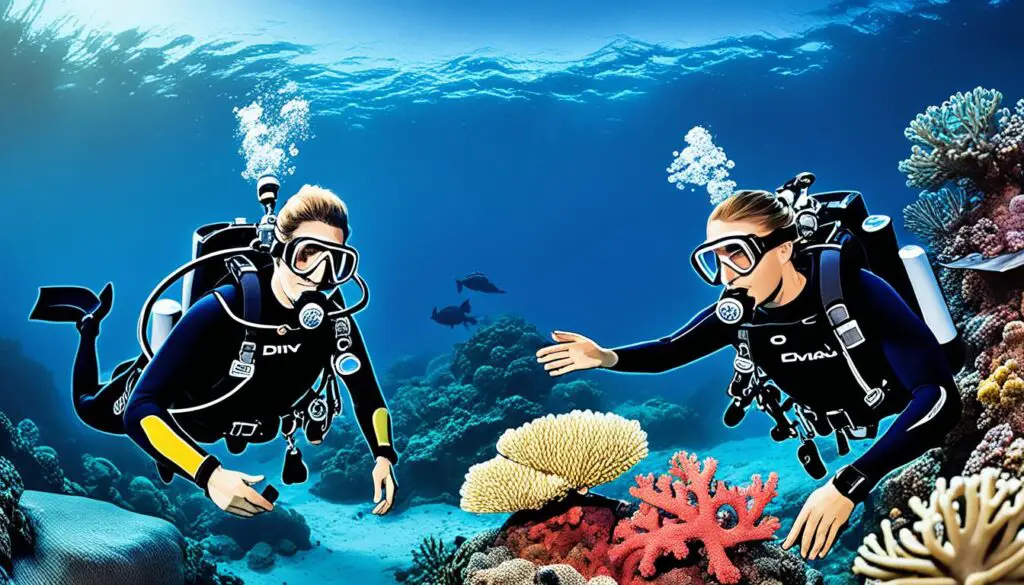Getting a diving certification is important. It gives you the knowledge and skills needed to dive safely. Many organizations worldwide provide various dive courses. In the United States, PADI (Professional Association of Diving Instructors) is a top choice for certification. The Open Water Diver Course is their starting certification. It mixes classroom sessions with hands-on training in both pools and the open sea.
Other well-respected organizations include SSI (Scuba Schools International), NAUI (National Association of Underwater Instructors), BSAC (British Sub-Aqua Club), and SDI (Scuba Diving International). Each group offers its set of courses. This wide selection ensures there’s a perfect course for every diver. It doesn’t matter if you’re just beginning or aiming to up your diving game, there’s a certification course out there for you.
Key Takeaways:
- Obtaining a diving certification is essential for safe and enjoyable diving.
- PADI, SSI, NAUI, BSAC, and SDI are reputable certifying organizations that offer a variety of dive courses.
- The Open Water Diver Course is a popular entry-level certification offered by PADI.
- Each certifying organization has its own unique courses and specialties to cater to divers’ needs.
- Choosing the right dive certification depends on your location, goals, and preferences.
Choosing the Right Dive Certification
There are many dive certifications and organizations to choose from. Making the right choice can be tricky. Some well-known groups are PADI, SSI, NAUI, CMAS, and SDI. They all have different levels of certification, from beginners to pros, each level with its own set of skills to attain.
It’s crucial to look at what’s available where you live and your diving plans. Here’s a rundown of some top certifications:
- PADI: PADI is the biggest and well-known worldwide. It provides a broad selection of courses for divers.
- SSI: With SSI, you can learn key concepts online at your pace. This makes it a flexible option for many.
- NAUI: NAUI takes pride in training fewer divers but thoroughly. Their courses cover both the theory and hands-on skills deeply.
- CMAS: An international body, CMAS, has certifications that various countries accept. They focus on safe diving and protecting the environment.
- SDI: For those eyeing technical diving, SDI offers courses in advanced techniques and equipment. It’s favored among future tech divers.
With your location, goals, and what you prefer in mind, pick a diving certification that fits you. Remember to choose one that matches your skills and what you want to achieve in diving. Let’s dig into why gaining a diving certification is important.

The Importance of Diving Certifications
Dive certifications are vital for ensuring your safety and being responsible while diving. They equip you with knowledge and skills important for safe diving in various settings.
Having a certification shows you’re skilled and dedicated to diving within safe limits. Each certification comes with rules on maximum depths and allowed gear. Understanding these keeps you safe by staying within your abilities and avoiding common dangers.
Moreover, certifications help others in the diving community, like dive shops and fellow divers, understand your training and experience level. This mutual understanding makes diving safer for all involved by ensuring everyone has the necessary skills and knowledge.
Certifications also open doors to perks, such as getting equipment or tank refills from certified dive shops. These benefits are there for those who have shown they know how to dive safely.
By getting certified, you not only look after your own safety but also the safety of others in the diving world. Next, we’ll explore the various types of dive certifications available.
The Importance of Diving Certifications
Diving certifications keep diving safe and responsible. They teach divers needed skills for safe dives in any place. Certifications set depth limits and what gear to use. They help divers know what they can and cannot do.
These certifications show dive centers and other divers your skill level. They make the diving community safer. Without a certification, it’s hard to tell how skilled someone is. This could make diving more dangerous.
Certifications let you rent gear and fill tanks at dive centers. Getting certified makes diving safer for you and others. It also protects the ocean life we love. It ensures a healthy future for our underwater world.
FAQ
What is a diving certification?
A diving certification is like a license to say you know how to dive safely. It shows you took a course and learned all you need to know. This way, you can enjoy diving without putting yourself or others in danger.
Why is a diving certification important?
Diving certifications are important because they make sure divers are prepared. They have the knowledge and skills to dive without risks. This helps make diving a safe and fun activity for everyone.
Which organizations offer diving certifications?
Leading groups like PADI, SSI, NAUI, CMAS, and SDI give out diving certifications. They set the world standards for teaching divers how to be safe and skilled underwater.
What is the difference between PADI, SSI, NAUI, CMAS, and SDI?
PADI has many courses and encourages worldwide diving. SSI stands out for its convenient online classes. NAUI focuses on making select divers very skilled. CMAS is globally respected for its teaching standards. SDI is great for those aiming to dive into more technical waters in the future.
How do I choose the right diving certification?
Choosing the right diving certification means considering your location, goals, and the organization’s reputation. Talking to advanced divers or instructors can provide solid advice.
Can I dive without a certification?
Yes, diving without a certification isn’t a good idea. It’s risky and could lead to problems. Getting certified is the best way to ensure safety and enjoy diving to the fullest.
